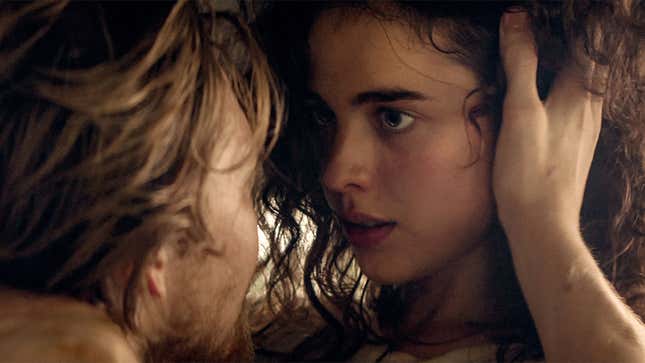What in the Tropical Hell Is Margaret Qualley Doing in ‘Stars at Noon?’
And more reviews for EO, Decision to Leave, and The Inspection from the New York Film Festival.
EntertainmentMovies

Here’s part 2 of our New York Film Festival coverage, with reviews of the new Park Chan-wook movie, Decision to Leave; the donkey drama EO; Elegance Bratton’s feature debut, The Inspection; and Margaret Qualley’s wild, wild turn in Claire Denis’ Stars at Noon. (And here’s part 1 of our coverage.)
Stars at Noon
Margaret Qualley in Stars at Noon, like Showgirls’ Nomi Malone, is no butterfly. She’s all pelvic thrust. I mean, she prowls. She’s got it! Also like Nomi Malone, her character Trish is prone to rapidly cycling through giddiness and rage—her outbursts are almost as frequent as the downpours in Nicaragua, where she is stranded while in the possession of fistfuls of the local currency, córdobas. She turns tricks for the much more valuable U.S. dollar, which is how she gets mixed up with Daniel (Joe Alwyn), a Brit in town for…business or something. They’re both in trouble and headed for more, and her attempts to get a plane ticket home to D.C. are complicated by her association with him, as he’s suspected of some shady dealings having to do with oil. (“He’s taking advantage of local elections and meddling with the balance of power that was so difficult to achieve,” a CIA agent played by Benny Safdie later explains. Like much of the movie’s dialogue, it takes a stab but stops short of clarity.)The makeshift couple are not in so much trouble that they don’t find the time to drink prolifically and fuck near constantly. Qualley as Trish, a self-described journalist who wrote on recent kidnappings and hangings but is firmly dismissed by her editor (John C. Reilly in a cameo) for having taken his magazine for a ride, goes for it. The problem with this movie, directed by beloved French auteur Claire Denis, is that what it is remains elusive. Why is anyone doing what they’re doing, ever? Trish splashes in puddles, smokes while eating eggs, screams “EAT ME!!” to a man on the street who calls out to sell her a car, and is nude about as much as, yes, Elizabeth Berkley in Showgirls. This includes stray shots of her on the toilet and changing, as if to remind us that gratuitousness is the very point of the exercise at hand.
-

-

-

-

-

-

-

-

-

-

-

-

-

-

-

-

-

-

-

-

-

-

-

-

-

-

-

-

-

-

-

-

-

-

-

-

-

-

-

-








































